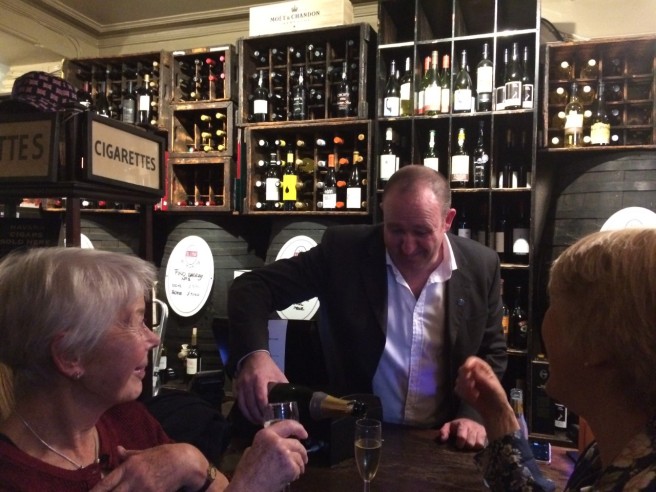 Thirty-five years after winning a landmark sex discrimination case lawyer Tess Gill and journalist Anna Coote were welcomed as guests of honour and given champagne and tapas on the house by the bar that banned them for life after their Court of Appeal victory in 1982.
Thirty-five years after winning a landmark sex discrimination case lawyer Tess Gill and journalist Anna Coote were welcomed as guests of honour and given champagne and tapas on the house by the bar that banned them for life after their Court of Appeal victory in 1982.
Back then, despite the Sex Discrimination Act 1975, women were not allowed to be served at the bar of El Vino, the Fleet Street haunt of journalists and lawyers, on which the fictional Pomeroys in John Mortimer’s Rumpole books was based.
El Vino had argued that the ban ensured female patrons were not jostled at the bar and claimed that it was upholding ‘old fashioned ideas of chivalry’.
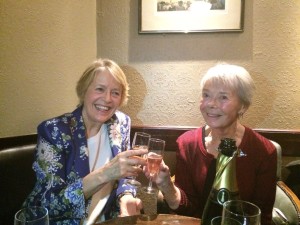 The Court of Appeal overturned a ruling of Judge Ranking sitting at the Guildhall Mayor’s Court and said that the wine bar was breaking the law by refusing to allow women to stand and be served at the bar.
The Court of Appeal overturned a ruling of Judge Ranking sitting at the Guildhall Mayor’s Court and said that the wine bar was breaking the law by refusing to allow women to stand and be served at the bar.
All thee appeal court judges, Lord Justice Eveleigh, Lord Justice Griffiths and Sir Roger Ormond, had to declare an interest in the case as they all drank at El Vino.
The Court of Appeal ruled that when a woman was refused a drink at the bar, she was ‘denied the opportunity to drink where other s did, to mix with other people who were drinking in EL Vino, was denied the flexibility of choice of companion.’
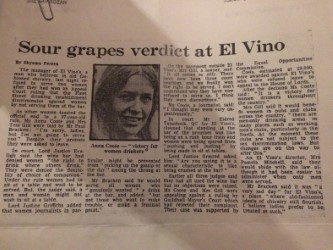 Lord Justice Griffiths, said that El Vino’s popularity among journalists made it one of the famous ‘gossip shops of Fleet Street’ and that confining women reporters to the back tables put them at a special disadvantage in ‘picking up gossip of the day’.
Lord Justice Griffiths, said that El Vino’s popularity among journalists made it one of the famous ‘gossip shops of Fleet Street’ and that confining women reporters to the back tables put them at a special disadvantage in ‘picking up gossip of the day’.
Despite their court victory, the pair were not welcome at the bar. As the press reported at the time, the then manager Jeremy Jones, said: ‘They will not be served here at any time. They are not welcome. Under the licensing laws we do not have to give a reason for refusing to serve somebody.’
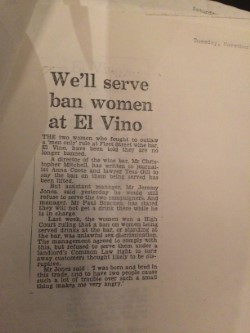 The manager, Paul Bracken, said he would serve all women who ‘genuinely wanted’ a drink, but ‘not those who want to make trouble or a feminist point’. Their ban was subsequently reversed, but Jones said he would still refuse to serve them.
The manager, Paul Bracken, said he would serve all women who ‘genuinely wanted’ a drink, but ‘not those who want to make trouble or a feminist point’. Their ban was subsequently reversed, but Jones said he would still refuse to serve them.
He said: ‘I was born and bred in this trade and to have two people cause such a lot of trouble over such a small thing makes me angry.’
But last night, on the 35th anniversary of the judgment, the current general manager Mark Fuller welcomed Gill and Coote as guests of honour, in the bar that was packed in their honour. Champagne and canapés were sold to raise money for the Fawcett Society, which campaigns for gender equality and women’s rights.
Fuller said the incident ‘happened in the past’ and was ‘regrettable’. He felt that apologising for it would be meaningless and akin to politicians apologising for things that happened before they were in office.
But he said: ‘You can tell what we think about it by what we did today. We embrace everyone as equals in our bar.’
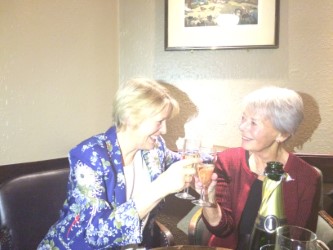 El Vino was founded by the wine merchant Alfred Bower, a former Lord Major of London, in Mark Lane as Bower & Co in 1879. It and was taken over by his son Frank Bower and subsequently chaired by his nephews Christopher Mitchell and his brother Sir David Mitchell, a cabinet minister in Margaret Thatcher’s government. and the father of Andrew Mitchell, the former Conservative chief whip at the centre of the ‘Plebgate’ saga. In 2015 El Vino as sold to the Davy’s wine bar chain and subsequently revamped.
El Vino was founded by the wine merchant Alfred Bower, a former Lord Major of London, in Mark Lane as Bower & Co in 1879. It and was taken over by his son Frank Bower and subsequently chaired by his nephews Christopher Mitchell and his brother Sir David Mitchell, a cabinet minister in Margaret Thatcher’s government. and the father of Andrew Mitchell, the former Conservative chief whip at the centre of the ‘Plebgate’ saga. In 2015 El Vino as sold to the Davy’s wine bar chain and subsequently revamped.
Gill and Coote had taken the case, backed by the Council for Civil Liberties (now Liberty), five years after Sheila Gray, a photographer at the Morning Star, had failed in a similar action taken immediately after the Sex Discrimination Act 1975 came into force.
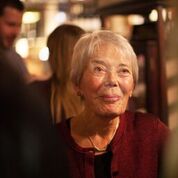
Gill recalled: ‘It was decided that a lawyer and a journalist would be most suitable plaintiffs. It was all completely set up. We got two male colleagues who would act as witnesses.
El Vino had justified the ban in the previous case by saying in part that women’s handbags got in the way. So, said Gill: ‘We made sure that the men had briefcases and that we went in without bags.
‘We had asked the men to go in wearing kilts, but they refused.’
While the men were served, the women were refused service and asked to go and sit in the back. The women protested that they wanted to stay and talk to their friends, but to no avail, and left.
‘We were rather miffed. When we left, the men stayed and finished their drinks. We thought they should have walked out with us,’ said Gill.
‘It feels weird to be back,’ she said and reflecting on how times have changed, added: ‘Today, things are complicated – some things are worse and some are better. The El Vino episode wouldn’t happen today, but social media has opened a new means by which women are being the prey for objectionable comments.’
Recalling the victory, Coote said: ‘We knew at the time that this was important – we had to create case law.
‘The main reason for taking the case was not just about the bar flouting the law – it was a place where some of the most influential people in the legal media world went — it was a challenge to a complacent establishment.
Making women sit at the back rather than drink at the bar, she said was a ‘subtle’ action, but one that made them ‘dependent and passive’.
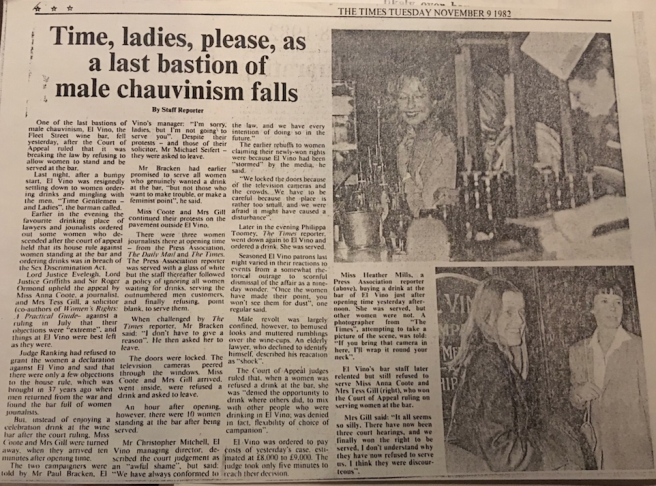 Heather Mills, a journalist who now works for Private Eye, was the first woman to be served at the bar after the court case. Recalling it, she said: ‘It is incredible to think that it wasn’t that long ago that you couldn’t buy a drink at the bar there.’
Heather Mills, a journalist who now works for Private Eye, was the first woman to be served at the bar after the court case. Recalling it, she said: ‘It is incredible to think that it wasn’t that long ago that you couldn’t buy a drink at the bar there.’
Jeannie Mackie, a barrister at Doughty Street Chambers, who came to El Vino especially for the occasion, said: ‘It was an extremely important case and made big waves at the time. They took on the male establishment. It was a remarkable case.
Viv Taylor-Gee, a witness in the case, said: ‘Like a lot of things it looked like a small victory. So many things in women’s issues look like they are small, but they have the effect of putting women at the back — while they appear trivial on the surface and men laugh at them, they are humiliations and they matter.’
Ruby Coote, Anna’s daughter, said: ‘I am really proud of what they did. There is still sexual harassment and inequality. I don’t feel equal, but I have a better time than back then.’
But she added: ‘It is harder to fight against it now – we have no laws to change, but still need to make change happen’.
